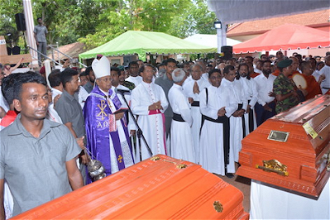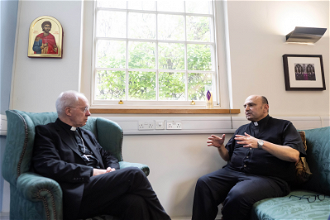Bethlehem and the Gaza Strip: 'two of the largest open prisons in the world'
I have just returned from visiting two of the largest "open prisons" in the world - Bethlehem and the Gaza strip. Travelling to Bethlehem even with a western passport is like entering a prison. There is a high wall surrounding the city. This is the security wall or fence that the State of Israel has built. There are armed guards at the border who always seem suspicious of your purposes and reasons for visiting. The reason is security, and the suicide bombers have ceased since the wall was created. The cost, however, for the majority of law-abiding citizens, is enormous. Measures are being taken to improve the situation for pilgrims travelling to Bethlehem, and this is welcome. However, this will not help the local population, who have great difficulty in getting to work, visiting relatives, going to school or university and even getting emergency treatment in hospital. I met an eighteen-year-old Christian woman who has never been to the Holy Places in Jerusalem even though she would like to go. Occasionally she may get permission, but it is limited and always on the conditions made by the Israeli State. That is like living in a suburb of Birmingham and never being able to go to New Street Station in the city centre. I, an outsider, can move freely to visit these places. I met a Jewish mother of three in Jerusalem who is frightened every morning to let her children go to school on the bus in case of bombings. She tries to see that they do not travel on the same bus, hoping that at least only one child would be hurt or killed should there be a bombing. This is everyday life for the people of Jerusalem and the West Bank. Gaza is a bomb waiting to explode. There are over one million people living on a strip of land that is roughly 45 km by 6 km. Parts of the area are like the many developing countries I have been in. Yet Gaza is little more than an hour,s drive from Tel Aviv, a modern, thriving city. In Gaza there is real poverty and a sense of hopelessness. Yet the memory that remains with me was a visit to a school where I watched teenage boys and girls sing and dance with a joy and enjoyment of life. There is hope if you look for it, but the reality in Gaza for many is nearer to despair. In other parts of the West Bank I met old people who with tears in their eyes told me that they would probably never again see their children, who had emigrated to other countries for a better life. I am one of more than 15 Roman Catholic Bishops, from Europe and North America, who have visited the Holy Land every year, for the past six years, to support the Catholic Bishops of the region. I have become more and more aware that the only hope in this situation is to take measures to enable ordinary people to trust one another. The violence, which is committed by both sides in this conflict, has to cease. The fear and suspicion that often seems to drive Israeli policy has to be replaced by trust and eventually by love. The Palestinians need to see that their hope of peace lies in negotiation and in trusting others, instead of in violence and extremism. Each year we Catholic bishops have met with the political leaders of Israel and of the Palestinian people. They can speak of their hopes and plans but the reality during these years is that little has changed, or if it has changed it is only for the worse. There is a need for real visionary political leadership that will inspire both Israel and Palestine to believe that it is possible to work together. I am returning to the Holy Land later this year and again in January 2008. It is only if we build long-term relationships that we have hope of finding a just and peaceful solution. That will be created when all of the three major religions of the region - Judaism, Christianity and Islam - learn to see that all men and women are created in the image of the same God as all three religions teach. That means that we are all sisters and brothers and members of the one family. The solution to the complex problems of the Middle East will not be found in politics alone, though good political leadership is absolutely necessary. There is a need for ordinary Israelis and Palestinians to discover that their sisters and brothers on "the other side" are also human beings. This cannot happen as long as measures are taken to see that people do not meet each other. It will only happen when ordinary Israelis and Palestinians can, and are encouraged to live together in peace. Bishop William Kenney, CP, is an Auxiliary Bishop in the Archdiocese of Birmingham, with responsibility for Coventry, Warwickshire and Oxfordshire. Spokesman on European Affairs for the Bishops' Conference of England & Wales, he visited the Holy Land as a representative of the Commission of Episcopal Conferences of the European Union, based in Brussels.


















